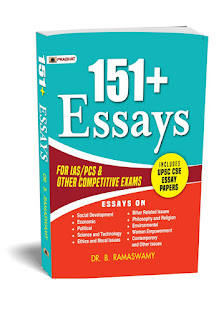Writing an essay for the UPSC (Union Public Service Commission) exam requires a strategic approach. Here are some key points to consider:
Understanding the Structure :
1) Introduction
- Start with a quote, a question, or an anecdote relevant to the topic.
- Provide a brief overview of what will be covered in the essay.
2) Body
- Main Argument: Present your main argument or viewpoint clearly.
- Supporting Points: Divide the body into paragraphs, each presenting a distinct point supporting your main argument.
- Counterarguments: Address potential counterarguments to show a balanced perspective.
- Examples: Use relevant examples, data, or case studies to substantiate your points.
3) Conclusion
- Summarize the main points discussed.
- Reiterate your thesis or main argument.
- End with a forward-looking statement, quote, or call to action.
Tips for Writing
1) Choose the Right Topic
- Select a topic you are comfortable with and have enough knowledge about.
- Ensure it has enough scope for discussion and analysis.
2) Clarity and Precision
- Be clear and concise in your writing.
- Avoid jargon and overly complex sentences.
3) Logical Flow
- Ensure a logical progression of ideas.
- Use transitional phrases to connect paragraphs and maintain coherence.
4) Balanced Perspective
- Present a balanced view by discussing different aspects of the topic.
- Acknowledge counterarguments and provide rebuttals.
5) Time Management
- Allocate time for planning, writing, and revising.
- Stick to the word limit (usually 1000-1200 words).
Common Topics
1) Social Issues
Gender equality, poverty, education, healthcare, etc.
2) Economic Issues
Economic development, unemployment, sustainable development, etc.
3) Political Issues
Democracy, governance, international relations, etc.
4) Environmental Issues
Climate change, biodiversity, pollution, etc.
5) Science and Technology
Technological advancements, ethical implications, etc.
Sample Outline
Topic: The Role of Education in Social Change
1) Introduction
- Quote: "Education is the most powerful weapon which you can use to change the world." – Nelson Mandela
- Brief overview of the role of education in societal transformation.
2) Body
- Importance of Education
- Empowerment and self-reliance
- Economic growth and development
Social Impact
- Reducing inequality
- Promoting social justice and inclusivity
Challenges in Education
- Accessibility and affordability
- Quality of education and curriculum relevance
Examples and Case Studies
- Successful educational reforms in different countries
4) Conclusion
- Summary of key points
- Reiteration of the transformative power of education
- Call to action for policy makers and society to invest in education
By following these guidelines and practicing regularly, you can improve your essay-writing skills and perform well in the UPSC exam.




